Sharada's Wish
By Cecelia GC Ong (王慈惟)
Abridged and translated by Wu Hsiao-ting (吳曉婷)
Sharada's Wish
By Cecelia GC Ong (王慈惟)
Abridged and translated by Wu Hsiao-ting (吳曉婷)
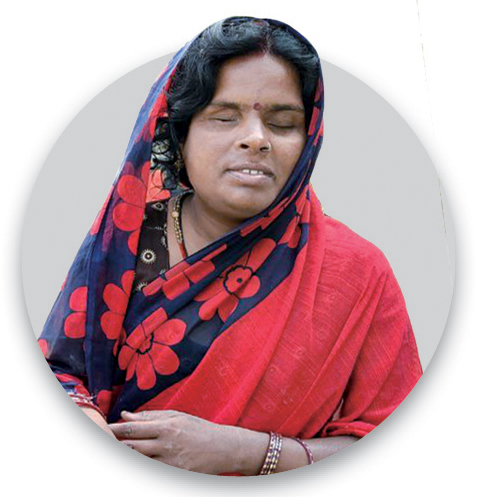
On April 28, 2022, I arrived in Nepal again from Malaysia, along with three fellow volunteers, Tang Kiat Beng (陳吉民), Ching Chen Hua (莊菀佳) and Lee Meow Hong (李妙紅). We were there to help with Tzu Chi work. Two days later, we traveled to Lumbini, the Buddha's birthplace. On May 4, we explored areas in the vicinity of Lumbini Park, taking in the living conditions of local residents. Looking curiously around, we saw cattle on the road, huts with their outer walls coated with cow dung, and village women dressed in colorful saris. We felt as if we had entered a time tunnel and had been immediately transported back to the Buddha's time.
As we were wondering whether the Buddha and his disciples had once crossed the nearby wooded area 2,500 years ago, we suddenly heard volunteer Chuan Yeong Ming (莊永銘), also from Malaysia, cry out: "Look!" Everyone turned toward his voice and saw a little boy covered with dirt, squirming on the floor of a house, trying to reach a nursing bottle with his mouth. Despite his struggles to feed himself, he wasn't having much success.
Volunteer Tang Kiat Beng, a medical doctor, entered the house. He picked up the nursing bottle, cradled the boy's head with one hand, and began feeding him the milk. The boy eagerly sucked on the bottle, making a happy "um, um" noise. He was swaying his head and hands at the same time, as if trying to express his joy and satisfaction at the ease with which he was eating.
Dr. Tang said that he had grown up in a rural area and that his family had once kept pigs. The little boy reminded him of how he had once seen newborn piglets, their eyes still closed, trying to reach their mothers' teats with their mouths to suckle. "This child, lying on the ground like a cat, working to reach his bottle with his mouth…what dignity does he have?" At this, the doctor became too overcome with emotion to say anything more.
That was how we first met Aman, Sharada Harijan's three-year-old son.
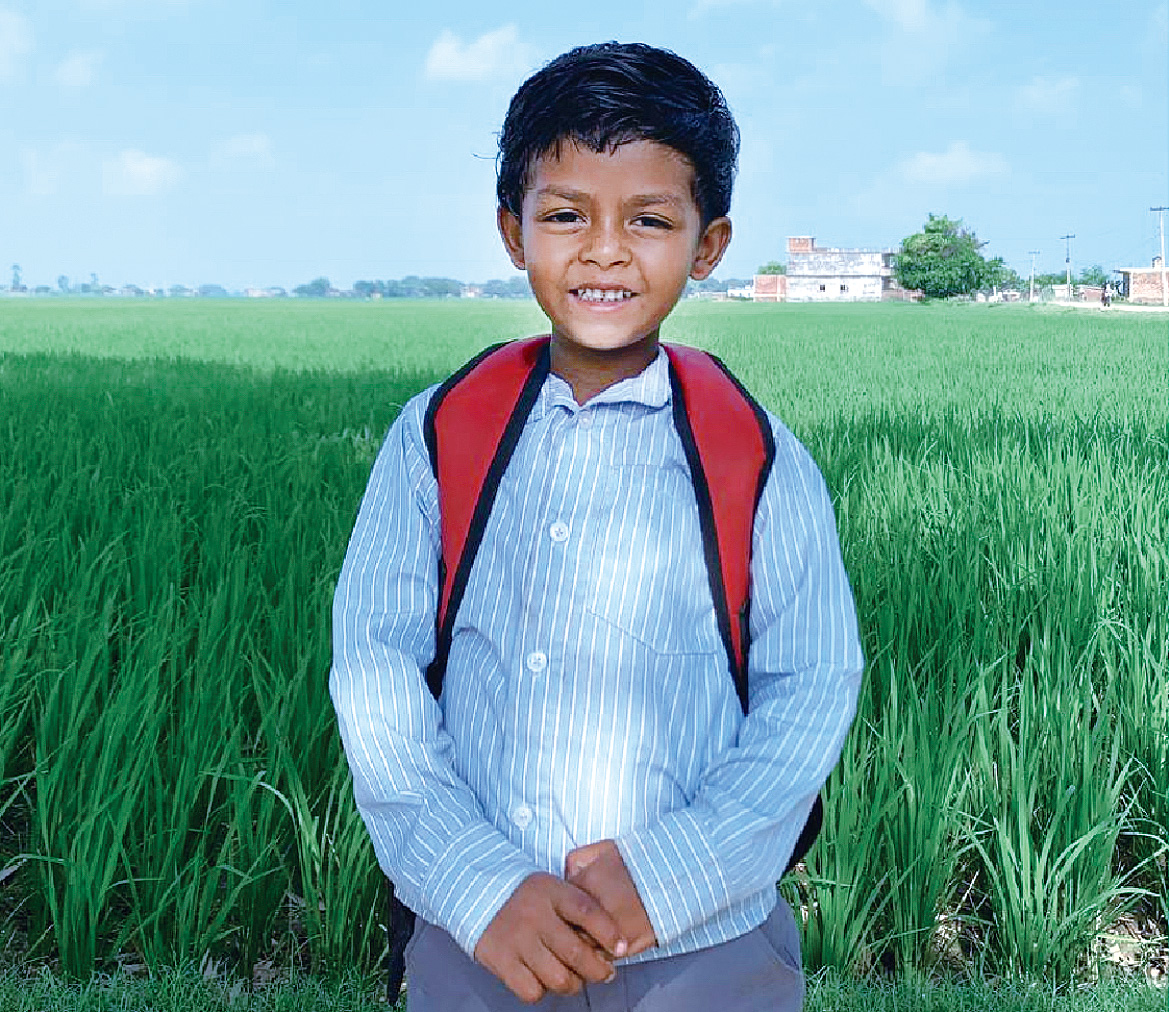
Sharada Harijan's daughter, Aniska, has begun going to school with Tzu Chi's help. (Unish Khyaju)
Visiting with the family
We met other members of the family that day. After talking to them and finding that they were having difficulty getting by, we decided to first help them with food for the month.
A few days later, we purchased rice, beans, nuts, cooking oil, salt, sugar, and coconut powder at a local store, and packed it all into a large plastic bucket. Then we all crammed into a small car driven by local volunteer Lilamani Sharma Poudel, nicknamed "Jupiter," to deliver the goods. We turned from a main road onto a small, uneven dirt road. Our car swayed left and right as our driver tried to avoid the potholes in our path, making us feel as if we were riding in a boat.
Finally, after much bumping and bouncing, a small brick house came into view—the same house where we had encountered the little boy a couple of days before. Jupiter parked his car under a large tree and we climbed out.
The house had been built by the local municipal government for the destitute family. It had no windows and only two doors, one of which was hung with a worn cotton cloth to serve as a door curtain. When we arrived, the grandma of the family was lying on a bed in a room. Jupiter asked us to wait outside while the people in the house readied themselves to meet us.
The grandma soon walked out to greet us. As we approached her, we saw Aman just inside the door, crawling on the floor. He was cute with a head of thick, curly hair and a pair of large, pearl-like round eyes. Had he been born into a wealthier family, he would have been lavished with love and attention. We walked over to him and picked him up.
All of a sudden, he tugged hard at our clothes. He seemed unused to the height now that we had lifted him in our arms. We inferred from his reaction that his family must have rarely held him. That was why he was so tense and scared about the height.
Aman wasn't wearing any pants, so we asked his grandma to get him a pair to put on. The grandma called out to Aman's father in the house to fetch a pair of pants for his son. When he brought some out, we tried to put them on Aman, but they were too small. He brought us another pair, but they were too loose at the waist. We eventually decided they would make do for now.
Through all this, Aman's mother, Sharada Harijan, was squatting near us on the porch, listening to everything that was happening. We went over to her and introduced ourselves. We told her we were from the same charity organization that had distributed rice to them during the pandemic and that we were visiting them because Dharma Master Cheng Yen, the founder of our organization, was concerned about their welfare.
Sharada was visually impaired. She told us her parents had told her that she could still see up until she was five, but after that her vision gradually deteriorated until she went completely blind. Khor Seok Hoon (許淑芬), also a volunteer from Malaysia, turned on the light of her cell phone and asked if Sharada could see the light. She shook her head no.
To Sharada, the world was a total blank—like her windowless bedroom, devoid of any light, any shadow. The colorful world she once was able to see had receded so far back in her memory, it was as if it had never existed.
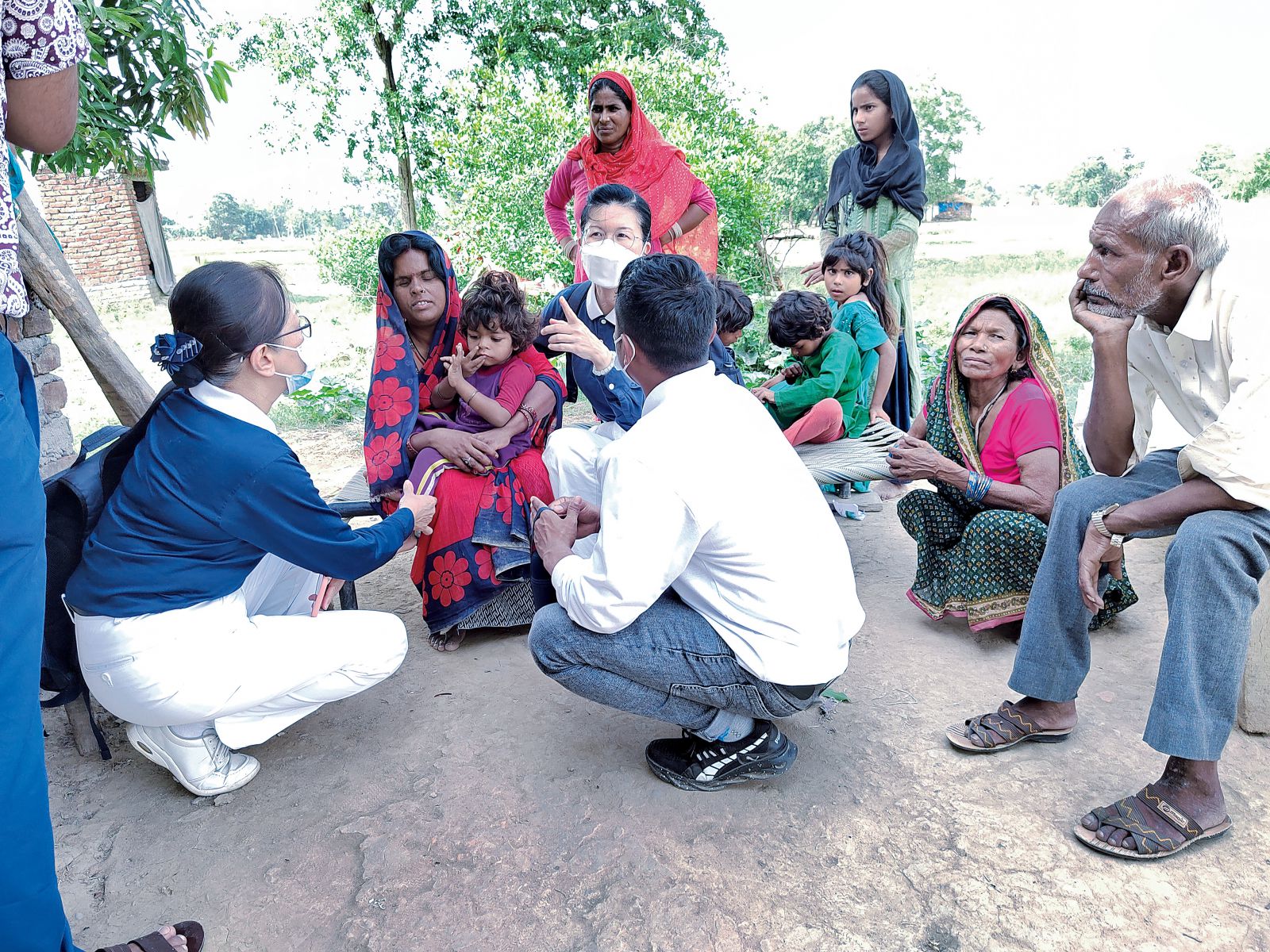
Tzu Chi volunteers asked how old Sharada was on a visit to the family on June 19, but no one seemed to be able to give a definite answer. Even neighbors joined in the discussion. (Lee Meow Hong)
Showing respect to Master Cheng Yen
After Sharada had told us her story, I put my hand to her cheek and said, "We Tzu Chi volunteers are here. We are here for you." Sharada reached up to touch my hand, then said to Brother Jupiter, who was interpreting for us, "This hand is so soft." Her hand soon moved to the bracelet of Buddhist prayer beads I was wearing on my wrist. Jupiter told her many Tzu Chi volunteers wore such a bracelet. Sharada responded with a smile, saying: "The beads must be very precious."
We told Sharada there was a picture of Master Cheng Yen on the largest bead on the bracelet. As soon as she heard that, she stopped smiling and the expression on her face turned solemn. She bowed her head, and then touched her forehead on the picture of the Master, clearly showing her respect for the Master. We were surprised and touched by her sudden gesture of reverence.
From that day onward, every time we visited, Sharada would walk out of her room with a big smile on her face and look for the bracelets on our wrists to pay her respect to the Master.
Losing her eyesight was just one of the misfortunes of Sharada's life. Along with her vision, a happy life seemed to be beyond her reach, too.
We asked the grandma of the family why she chose Sharada as her daughter-in-law. She answered, "My son has mental issues, and Sharada can't see. Since both are disabled, they make a good pair."
In this family of five, the only healthy one, aside from the grandmother, is a six-year-old daughter, Aniska. She might be the best hope the family has.
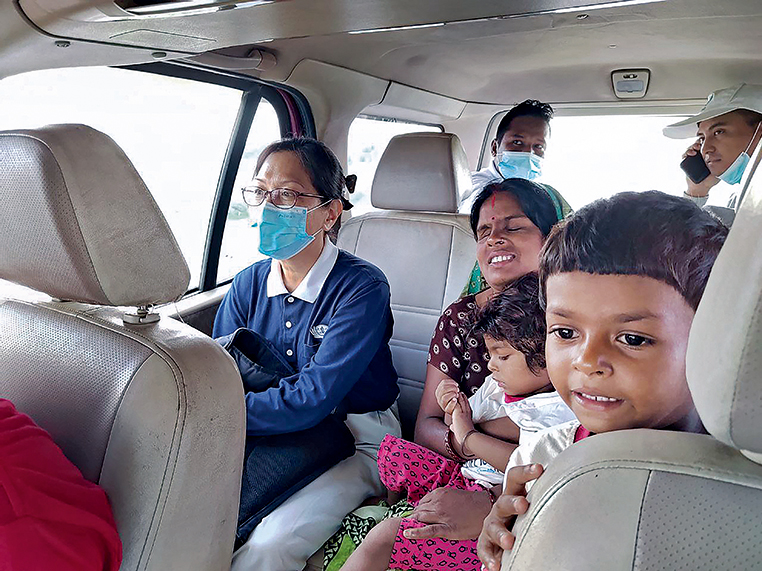
Aniska (right) is intrigued by the novelty of everything as she rides in a car for the first time, accompanying her brother to the doctor. (Lee Meow Hong)
A decision
We called on Sharada and her family again the next month, on June 19. Between our visits, we had returned to Malaysia and come back to Nepal. Sharada had been on my mind a lot while back in Malaysia, and I had often dreamed of Aman. But in addition to providing the family with food, we hadn't yet found other ways to help them.
Sharada held my hand tightly in hers during our visit on June 19. As we sat chatting outside the family's house, I asked how old she and her husband were. I thought the question was straightforward, but no one seemed to be able to give a definite answer. The grandma said about 30, but Sharada shook her head no. Quite a few neighbors had gathered around us—even one who was passing by on her way to graze her sheep—and everyone put in their two cents as to their age. After an animated discussion, they reached some consensus: Sharada was 35 to 40 years old, and her husband was about 50.
Sharada suddenly gripped my hand tighter, so tight I could feel perspiration forming between our hands. I asked, "How would you like us to help your family?" Sharada answered after a short pause: "You should know by now what my family is like. We're all illiterate; that's why we can't even calculate our own age. I'm shy to ask Tzu Chi of anything, but I do have one wish: I hope my daughter can go to school." I patted her hands, saying, "We heard you."
Afterwards, we invited Manoj Dhawal, a community coordinator who had accompanied us to Sharada's home and who was also taking Tzu Chi volunteer training courses on-line, to come to our hotel to discuss how to help Aniska go to school. As soon as we were all seated, we asked him how much money it would cost to send the girl to school. "Our public schools do not charge any tuition fees," Manoj said. "You can enroll a child in such a school as long as you have the money to buy uniforms and school supplies. But a family like Sharada's can't afford even the uniforms. Besides, they live too far away from a public school."
"What other options do we have?" we asked.
"There is a private school close to Sharada's home," Manoj answered, looking a little awkward, "but you'll need to pay tuition fees to study there."
We asked him how much we would need to pay for the registration fee and tuition for three months. Manoj said in a low voice, "About 3,800 Nepalese rupees [US$30]."
Volunteer Lee Meow Hong made a quick calculation on her cell phone. Looking at the result, we three volunteers from Malaysia looked at each other, then said to Manoj we had decided to help Aniska go to school. We suggested enrolling her in the private school the following day.
We gave Manoj 3,800 Nepalese rupees and wrote a simple letter of authorization right there. After signing on the letter, Manoj paused in thought for a moment. Then he sat down, rolled up the paper bills in his hand, and gripped them tightly. Raising his head, he said to us: "Sharada and I are from the same hometown. Our fathers know each other. I've long hoped I could help her in some way, but I didn't know how."
He added that during the pandemic, Tzu Chi had distributed rice to Sharada's family twice and that the family received additional food from the foundation last month—a rich variety of food. "But no matter how much food you give them," he said, "it will eventually run out. Your decision today to send the child to school is the ultimate way to help the family: only with education can the family have hope." He had made the statement slowly, with tears in his eyes, his voice choking up.
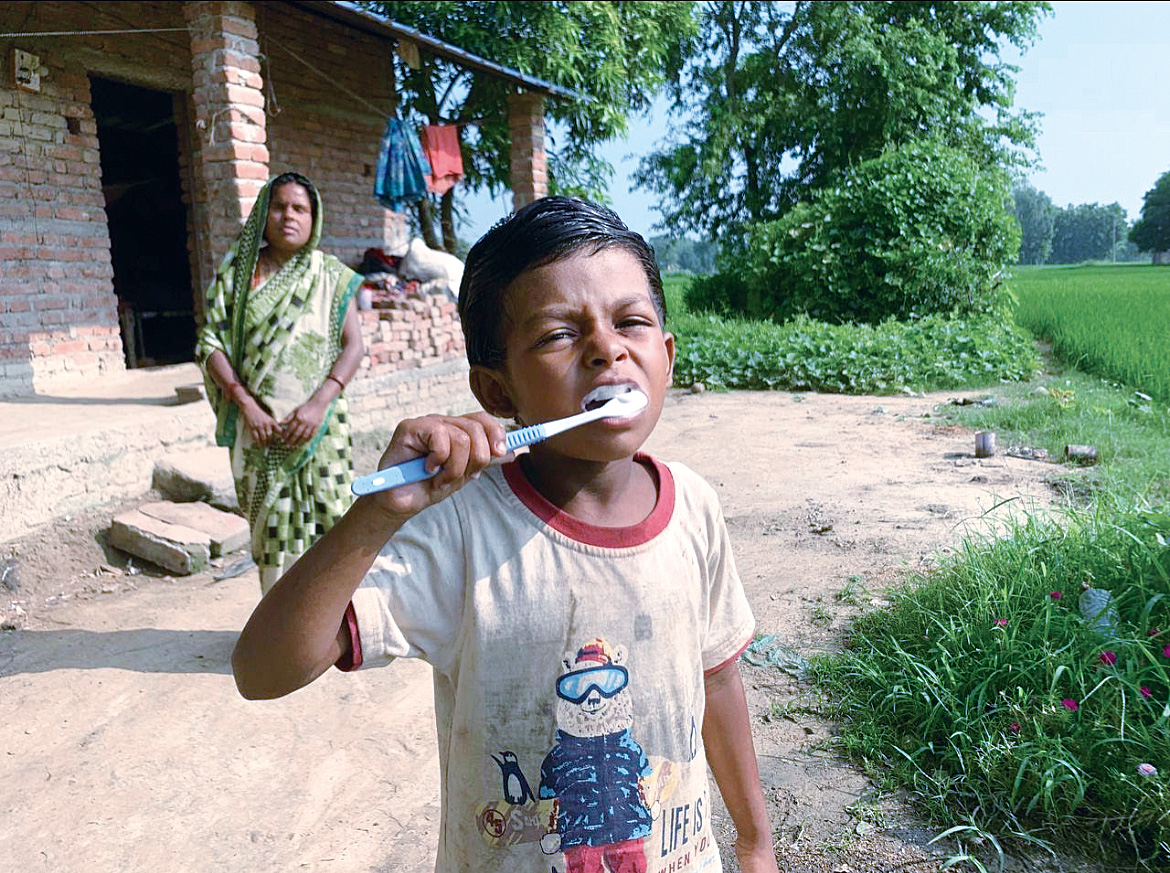
Aniska brushes her teeth as she gets ready for school on an early August morning. (Unish Khyaju)
Going to school
June 22 was Aniska's first day of school. It was a significant day, not just for the girl and her family, but for us Tzu Chi volunteers as well. Volunteer Unish Khyaju, who had traveled with us to Lumbini from Kathmandu, Nepal's capital, helped photograph the events of the day. He said, "We should make a toast for the occasion. We've done something very meaningful, something so valuable you can't put a price on it."
A class director from the school made a special trip to Sharada's home on a motor scooter to make sure that Aniska could go to the school. With him leading the way, Aniska's grandma and father, we Tzu Chi volunteers, and community coordinator Manoj accompanied the girl to school. We probably made up the largest team that had ever escorted a child to school in the village.
In fact, the school is within sight from the yard of Sharada's home. Many children pass the house on their way to the school every day. But despite its proximity, it might as well have been a hundred miles away for Aniska—she never would have been able to attend because her family couldn't afford it.
A tailor came to the school on Aniska's first day to measure her for her school uniform. The girl stood with a look of bewilderment on her face when the tailor looped a measuring tape around her neck. She had no idea what was happening. But she was back to her usual self when a teacher told her she could now enter the classroom to attend class with the other children. She waved to us and said, "Goodbye, Nana!"
"Nana" is what she uses to address her grandma, and the only form of address she knew for a family member other than those for her father and mother. We didn't know what "family" meant to Aniska, but we were certain she could already feel our care for her; that's why she called us "Nana."
Just two short weeks after she started going to school, Aniska looked completely different in appearance. Even volunteer Hong Siew Ling (方繡凌), who often visited the family, could hardly recognize her. She cupped Aniska's little face in her hands and wondered if this was the same girl who used to stand with her arms akimbo, who didn't like to wear clothes, and who often ran amok all over the yard of her home.
In the days that followed, Aniska experienced many more "firsts" in her life. We brought new clothes to her and her brother, Aman, from Kathmandu. She also accompanied her brother in a car to a clinic to see the doctor.
It was the first time Aniska had ever ridden in a car. She looked curiously at the four wheels that could move and listened with great interest to the sounds from the radio. Hardly able to contain her excitement, she talked incessantly with a smile on her face, not caring if the Tzu Chi volunteers riding with her could understand her or not.
Early on the morning of August 5, volunteers Tulsi Narayan Matang and Unish Khyaju made a "spot check" on Aniska. They were concerned she might have had difficulty getting adjusted to school life. They wanted to find out how things were going: would the girl have taken a dislike to school?
As soon as they parked their car, they saw that Aniska was already up and getting ready for school. When Aniska saw the two volunteers, she grabbed her new toothbrush and ran to the water pump. Pumping some water into a cup, she brushed her teeth in earnest. She was showing off her new skill to the volunteers.
When she was done brushing her teeth, she went to her room to change into her school uniform. Then, shouldering her book bag, she set off to school. She looked so refreshed and spirited, walking on a trail amidst green, lush paddy fields. The mere sight of her inspired joy. She was as full of life and vitality as the rice seedlings in the field doing their best to grow.
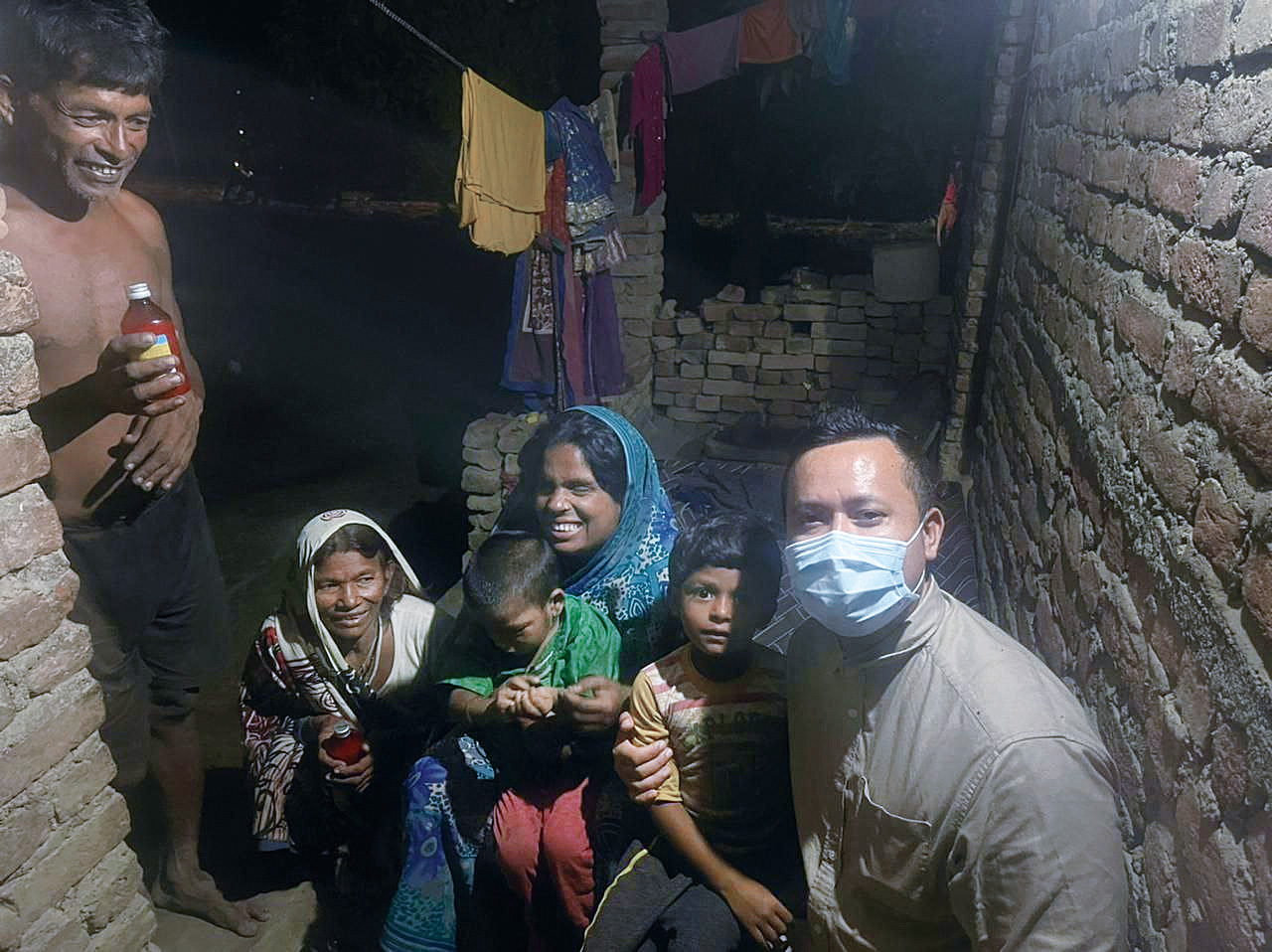
Volunteer Siddhartha Gurung (right) poses with Sharada and her family after delivering medicine for Aman's epilepsy to the family late on the night of August 1. (Courtesy of Siddhartha Gurung)
Medicine for Aman
After meeting Aman on our first visit to Sharada's home, Dr. Tang Kiat Beng had emphasized the need to take him to the doctor for an examination to find out why he wasn't developing as well as other children his age. Even though he was three, his legs were still too weak to enable him to stand and walk. Volunteer Lee Meow Hong arranged for the trip. At the doctor, Aman was diagnosed with epilepsy—the result of a fever not treated in time when the boy was younger.
Aman's epilepsy medicine needed to be imported from India. Siddhartha Gurung, a volunteer in Lumbini, asked a friend to buy the medicine for him in India. When he received the medicine from the friend, he delivered it to Aman.
Aman's condition gradually stabilized after he started on medicine. He used to suffer from several seizures a day, but the medicine was so effective the fits stopped. He was also able to sleep more soundly, and was finally responding to his family when they called him.
Another happy development was that his family started to pay more attention to him. I still remember that when we visited the family for the first time, we saw how unkempt he was, covered with dirt. We asked his grandma at that time if we could help wash him, but she replied that there was no need for us to take the trouble. "He'll just get dirty again in no time," she had said. Hearing that, we realized that was probably how kids were treated locally.
We included the family on our long-term care recipient list in May. Three months later, when Dr. Tang visited the family again, he found that Aman's legs had become stronger than when he had first seen him. Happy for the boy, Dr. Tang asked his grandma to help Aman up on his feet whenever she could so that he could practice standing. The grandma did as the doctor had told her. A week later, when we passed Sharada's home, we saw from our car window the grandma helping Aman practice walking. We immediately got out of our car to take a look. As we approached the grandma and grandson, we saw the clear footprints Aman had made on the dirt ground, indicating firmer steps. We were all so excited.
On September 15, Goh Lam Kia (吳南凱), a fellow volunteer from Singapore, and Tulsi Narayan Matang, who among all our volunteers knew Sharada the best, delivered food to the family. From the video they took of their visit, we saw Aman as he was learning to walk. Though his steps weren't very steady yet, we were as happy as could be. Although Aman had missed the best time to go to the doctor, resulting in his inability to speak and walk properly, we sincerely hoped that with our help and with his family now knowing how to take better care of him, he would make good progress every day.
We know there are more people waiting
We don't know how long Sharada had waited until she met Tzu Chi. We don't know either whether there are many more Sharadas in Nepal needing our help. But no matter what, we'll continue to reach out so that we can meet more Sharadas and help make a difference in their lives. That's how we can emulate the Buddha's heart and embrace Master Cheng Yen's mission as our own in the country in which the Enlightened One was born.
Contact Us | Plan a Visit | Donate
8 Lide Road, Beitou 11259, Taipei, Taiwan
886-2-2898-9999
005741@daaitv.com
©Tzu Chi Culture and Communication Foundation
All rights reserved.
